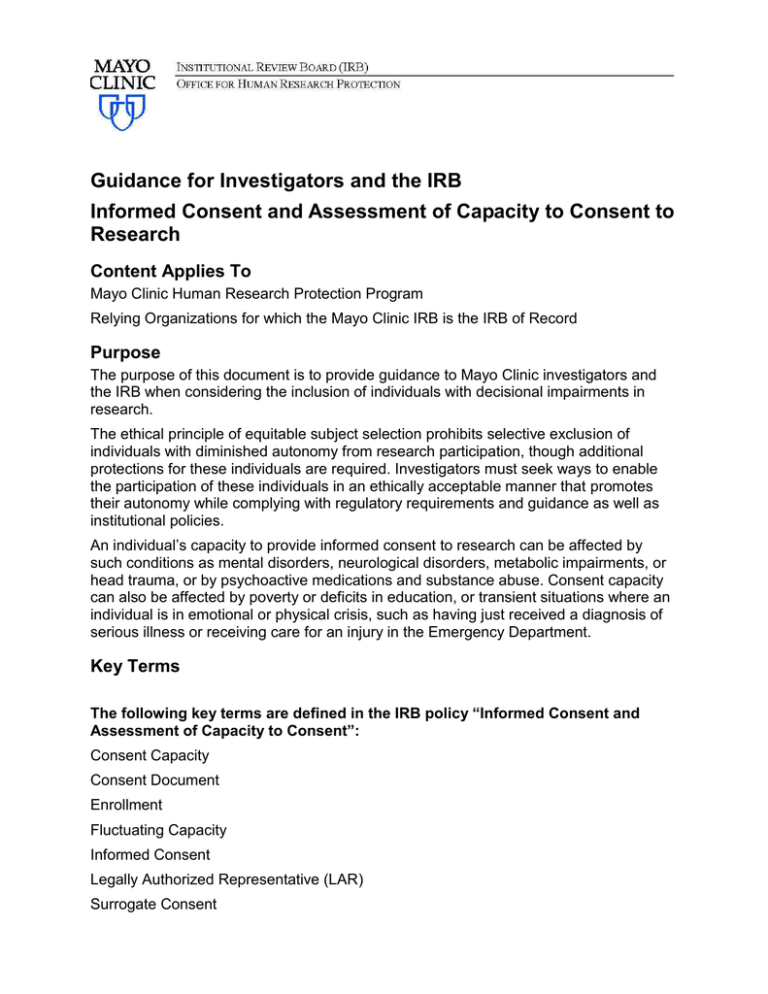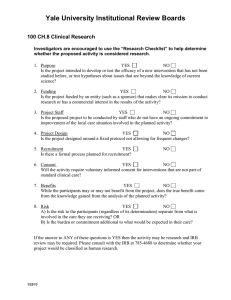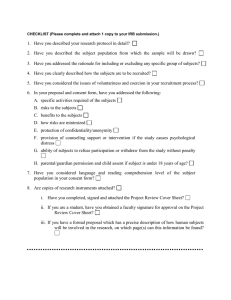Guidance for Investigators and the IRB Informed Consent and
advertisement

Guidance for Investigators and the IRB Informed Consent and Assessment of Capacity to Consent to Research Content Applies To Mayo Clinic Human Research Protection Program Relying Organizations for which the Mayo Clinic IRB is the IRB of Record Purpose The purpose of this document is to provide guidance to Mayo Clinic investigators and the IRB when considering the inclusion of individuals with decisional impairments in research. The ethical principle of equitable subject selection prohibits selective exclusion of individuals with diminished autonomy from research participation, though additional protections for these individuals are required. Investigators must seek ways to enable the participation of these individuals in an ethically acceptable manner that promotes their autonomy while complying with regulatory requirements and guidance as well as institutional policies. An individual’s capacity to provide informed consent to research can be affected by such conditions as mental disorders, neurological disorders, metabolic impairments, or head trauma, or by psychoactive medications and substance abuse. Consent capacity can also be affected by poverty or deficits in education, or transient situations where an individual is in emotional or physical crisis, such as having just received a diagnosis of serious illness or receiving care for an injury in the Emergency Department. Key Terms The following key terms are defined in the IRB policy “Informed Consent and Assessment of Capacity to Consent”: Consent Capacity Consent Document Enrollment Fluctuating Capacity Informed Consent Legally Authorized Representative (LAR) Surrogate Consent Therapeutic Misconception Vulnerable Populations Impaired Consent Capacity Policy/Procedure 1) Investigator responsibilities for studies planning to enroll participants who may have impaired consent capacity The Investigator will describe assessment methods and instruments within the protocol or IRB application that will be used in evaluating the capacity of a potential participant to provide initial and continued consent. o Assessments may include the use of consent quizzes, the participation of a consent monitor, subject advocate, or independent clinician in the consent process, standard psychological and neuropsychological screening tools, and/or formal instruments for assessing capacity to consent to involvement in research. The design of the consent process may include several meetings between the potential participant and the study team to assure that the potential participant has been fully informed of the study and demonstrated sufficient recall and comprehension. o An individual’s consent capacity may also be assessed by discussing the proposed study with her/him and then asking specific questions requiring descriptive answers, for example: Can you tell me the purpose of this study? Do you have to be in this study? Can you tell me what will happen if you agree to take part in this study? How might this study not help you or even hurt you? How might this study help you? What would you do if you wanted to leave the study? What will happen if you decide not to be in the study? Asking questions about the study allows the person obtaining consent not only to assess participant understanding, but provides the opportunity to correct any misunderstandings or answer additional questions the participant may have. If adequate consent capacity is not found upon assessment the investigator must either exclude the potential participant from the study or seek surrogate consent for participation. o ”Informed Consent for Research: A Guide to Assessing a Participant’s Understanding” is available on the Mayo Clinic IRB Website at http://intranet.mayo.edu/charlie/irb. Click on the “Forms and Procedures” tab, then on “Forms and Templates”. The guide is located in the "Consent Tools" section of the page. Examples of existing cognitive tests include the Mini-mental State Evaluation (MMSE) and the Montreal Cognitive Assessment (MoCA). Comprehensive capacity assessment instruments include the MacArthur Competence Assessment Tool for Clinical Research (MacCAT-CR) and the University of California, San Diego Brief Assessment of Capacity to Consent (UBACC). When seeking to apply cognitive screening tests and competence assessments, researchers should consult scholarly reviews to ensure that the chosen test or instrument is effective and appropriate to the study, for example: Cullen et al. (2007). “A review of screening tests for cognitive impairment.” Journal of Neurology, Neurosurgery & Psychiatry, 78: 790-9; Dunn et al. (2006). “Assessing decisional capacity for clinical research or treatment: a review of instruments.” American Journal of Psychiatry, 163: 132334; Jeste et al. (2007). “A new brief instrument for assessing decisional capacity for clinical research.” Archives of General Psychiatry, 64(8): 966-74. Additionally, formal guidelines for conducting assessments include those given by the American Psychological Association Guidelines for Assessing the Decision-Making Capacities of Potential Research Subjects with Cognitive Impairment. Additional monitoring/assessment at specified study time points may be required when the participant’s involvement will continue over a period of time or if the potential participant’s decisional impairment changes or is expected to change. Cognitive tests and competence assessment instruments alone cannot provide the basis of the evaluator’s determination regarding a participant’s capacity to consent, and should at most supplement or support the evaluator’s expert judgment. Documentation of the assessment should be retained in the study files. This documentation should not be included in the electronic medical record. o If an independent assessor is involved in the consent process the independent assessor will be responsible for providing a report outlining the outcome of each potential participant's initial assessment of capacity to consent. The investigator is responsible for submitting the report of the assessor's findings to the IRB as part of the study’s continuing review. 2) IRB responsibilities when reviewing protocols planning to enroll participants who may have impaired consent capacity The IRB, when applicable, will evaluate the role of the LAR in the consent process. o The Mayo Clinic IRB will consider applicable laws and may consult with legal counsel when deciding who can serve as an LAR for participants of proposed research under the laws of the jurisdiction in which the research is conducted (e.g., local or state law). This includes situations in which the Mayo Clinic IRB serves as the IRB of Record for a Relying Organization in a jurisdiction other than the jurisdictions of the three major Mayo Clinic campuses. o An acceptable LAR in these jurisdictions is described in the Mayo Clinic IRB policy “Selecting a Legally Authorized Representative” . Legal counsel is available to assist the Mayo Clinic Institutional Review Board (IRB), and Mayo Clinic researchers and study teams regarding the: Applicability of federal and state laws involving human subjects research, Resolution of any legal issues related to research regulations involving human subjects, and the Resolution of conflicts among applicable laws within (or outside) the jurisdiction where the organization resides. Contact information for Mayo Clinic Legal Counsel is available on the Legal Department website. See website link below in “References and Resources”. The IRB may require inclusion of an independent assessor during initial assessment of a potential participant's capacity to consent as well as during the informed consent process. o An independent assessor must have no affiliation with the study or the sponsors of the study and may be, for example, a study coordinator not associated with the study, the Research Subject Advocate (RSA), or staff from the IRB Regulatory Compliance Unit (IRCU). o Upon direction from the IRB, the study team will propose an independent assessor and define the assessment process. o The IRB will review the independent assessor’s report submitted by the study team as part of the study’s continuing review. The report should be appended to the section of the Continuing Review form specific to documentation of study oversight activities. o If the independent assessor identifies evidence of coercion or undue influence, or has any concerns upon observation of the consent process, the independent assessor will report these findings to IRCU. The IRB will review determinations related to these findings as part of the study's continuing review. 3) Studies NOT planning to enroll participants who may have impaired consent capacity A study that did not specifically plan to enroll individuals lacking capacity to consent may encounter a potential participant where the study team is unsure if he or she has the capacity to provide informed consent. o The study team is responsible for assessing the potential participant’s capacity to consent utilizing tools such as described in Section (1) of this guidance. o The study team may also contact the RSA or IRCU to serve as an independent assessor. o If it is determined that the potential participant has the capacity to provide informed consent, the study team may enroll the participant and document the assessment(s) used and their findings in the study notes. o If it is determined that the potential participant does not have the capacity to provide informed consent, the investigator must either exclude the potential participant from enrollment to the study or seek surrogate consent for participation. Inclusion of a legally authorized representative for the use of surrogate consent requires submission of a protocol modification for review and determination by the convened IRB. In time-sensitive situations where delay of enrollment to allow review of the modification by the convened IRB may not be in the best interest of the participant, the study provides the potential for benefit to the participant, and the participant is not subject to protections by the federal regulations under 45 CFR 46 Subpart B (Pregnant Women, Human Fetuses and Neonates), and/or Subpart C (Prisoners): i. The investigator should submit a modification via IRBe requesting the use of a legally authorized representative for a single participant. The modification should include justification for inclusion of the participant and confirmation by the investigator that the study provides the potential for benefit to the participant. The modification should also include a revised consent form adding signature lines for the legally authorized representative, and revision of the IRBe application to include completion of the sections titled “Protected Study Populations” and “Adults Lacking Capacity to Consent”. ii. Contact the IRB Service Center and ask to speak to an IRB Operations Coordinator regarding the inclusion of a legally authorized representative for a single participant. iii. The IRB Operations Coordinator will consult with an IRB Chair to assess the modification via the expedited review process. iv. The enrollment process may proceed if the investigator receives IRB approval of the modification and when an approved consent form has been issued by the IRB. 4) Re-reviewing Research When an Adult Participant Unexpectedly Loses the Capacity to Consent A participant in a study that does not have IRB approval to include participants lacking capacity to consent may unexpectedly experience a substantial impairment to his or her functional abilities that is not foreseeably temporary. In this case, researchers should notify the IRB and the IRB should determine whether it is necessary to re-evaluate the participant’s capacity to consent and to determine whether the participant is permitted to remain in the study. o If time permits, the IRB notification process may include submission of a protocol modification to the IRB requesting IRB approval for the use of surrogate consent from a legally authorized representative and, when possible, assent from the participant for continuation of study participation. o When time does not permit submission of a protocol modification or when it is in the best interest of the participant, or when the lack of continued capacity to consent is contrary to the inclusion criteria of the study, the Principal Investigator may elect to discontinue the participant’s involvement in the study. If the participant may be harmed by immediate discontinuation of study interventions, the Principal Investigator may continue the study intervention until the IRB has been notified and acted on a protocol modification. o The unexpected impairment to functional abilities and/or early discontinuation of participation may require additional reporting to the IRB, e.g. UPIRTSO or reportable event. References and Resources Association for the Accreditation of Human Research Protection Programs (AAHRPP): Reviewing Research Involving Adult Participants with Diminished Functional Abilities Related to Capacity to Consent www.aahrpp.org Appelbaum, PS, and Grisso, T: MacArthur Competence Assessment Tool for Clinical Research (MacCATCR), Professional Resource Press, Law and Psychiatry Program, University of Massachusetts Medical School, Worcester, MA, 2001. Appelbaum, PS, and Candilis, PJ: A Direct Comparison of Research Decision-making Capacity: Schizophrenia/Schizoaffective, Medically Ill, and Non-Ill Subjects, 2009 Cullen et al. (2007). “A review of screening tests for cognitive impairment.” Journal of Neurology, Neurosurgery & Psychiatry, 78: 790-9; Dunn et al. (2006). “Assessing decisional capacity for clinical research or treatment: a review of instruments.” American Journal of Psychiatry, 163: 1323-34; Food and Drug Administration (FDA): Informed Consent Information Sheet: Guidance for IRBs, Clinical Investigators, and Sponsors http://www.fda.gov/RegulatoryInformation/Guidances/ucm404975.htm Jeste DV et al. (2007). A New Brief Instrument for Assessing Decisional Capacity for Clinical Research. Arch Gen Psychiatry 64(8):966-74. Minnesota Commitment and Treatment Act (2009) National Institutes of Health: Research Involving Individuals with Questionable Capacity to Consent http://grants.nih.gov/grants/policy/questionablecapacity.htm Sturman ED. (2005) The Capacity to Consent to Treatment and Research: A Review of Standardized Assessment Tools. Clinical Psychology Review. 25:954-974 45 CFR 46 21 CFR 50 and 56 The Belmont Report: http://www.hhs.gov/ohrp/humansubjects/guidance/belmont.html Mayo Clinic IRB Policy “Informed Consent and the Research Subject” http://mayocontent.mayo.edu/irb/DOCMAN-0000047834 Mayo Clinic IRB Policy “Special Categories of Research: Participants Who May Be Vulnerable to Coercion or Undue Influence” http://mayocontent.mayo.edu/irb/DOCMAN0000047857 Mayo Clinic IRB Policy “Selecting a Legally Authorized Representative” http://mayocontent.mayo.edu/irb/DOCMAN-0000047848 Mayo Clinic Policy “Informed Consent for Procedures Policy” http://mayocontent.mayo.edu/prmr/DOCMAN-0000156110 Mayo Clinic IRB Policy "Informed Consent and Assessment of Capacity to Consent to Research" http://mayocontent.mayo.edu/irb/DOCMAN-0000197825 Informed Consent for Research: A Guide to Assessing a Participants Understanding http://intranet.mayo.edu/charlie/irb/child-of-page-1/forms-library/ Approved by Research Committee Effective Date April 14, 2016 Revision History Date Synopsis of Change 4/14/2016 Addition of process for expedited review of modifications requesting inclusion of a legally authorized representative for a single subject. 4/7/2016 Fixed minor formating issues. 3/3/2016 Added bullet point to “Studies NOT planning to enroll participants who may have impaired consent capacity” to address potential participants not having the capacity to provide informed consent. 1/5/2016 New Document
![Lesson Study Project Informed Consent for Students 2011-12 [TEMPLATE]](http://s2.studylib.net/store/data/011897429_1-e9cd20ac12fa907a0c9dbbb5866bfc98-300x300.png)

